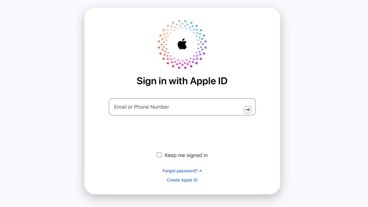First-known iPhone worm 'Rickrolls' jailbroken Apple handsets
A hacker who identifies himself as "ikex" created the worm, which changes the user's wallpaper to a picture of 1980s pop star Rick Astley, who sang the 1987 hit "Never Gonna Give You Up." The software includes the message: "ikee is never gonna give you up."
The term jailbreaking refers to a hack that allows users to run software not approved by Apple on the iPhone. It can grant users the ability to install custom wallpapers and themes, enable tethering, or unlock the handset for use on a non-approved carrier.
The ikex worm is simply a prank known as "Rickrolling," an Internet bait-and-switch meme when users expect to see a video on a certain topic, only to find themselves watching Astley's cheesy 1987 music video. According to Forbes, the worm does nothing malicious.
"The world's first iPhone worm is also hardly a true criminal exploit," the report said. "Instead, it seems to be half warning, half prank. Ikee's author, who identifies himself or herself as 'ikex' in the worm's source code, also wrote in the code that "People are stupid, and this is to prove it so," adding that users should read their phones' manuals."
For now, the worm is said to be spreading among jailbroken iPhones in Australia. It affects only users who did not change their default SSH password, which allows file transfers between phones.
"It's not that hard, guys," ikex wrote in the source code. "But hey who cares its only your bank details at stake."
Mikko Hyppönen, researcher with F-Secure, discussed the worm on his company's Web site. It lets users know how to change their root password, and also warns that the software could become more dangerous.
"The creator of the worm has released full source code of the four existing variants of this worm," he said. "This means that there will quickly be more variants, and they might have nastier payload than just changing your wallpaper or might try password cracking to gain access to devices where the default password has been changed."
This summer, Apple quickly fixed a text messaging exploit that could have affected all iPhones. The exploit took advantage of the fact that SMS can send binary code to a phone. That code is automatically processed without user interaction, and can be compiled from multiple messages, allowing larger programs to be sent to a phone.
The exploit, discovered by security researcher Charlie Miller, exposed the iPhone completely, giving hackers access to the camera, dialer, messaging and Safari.
Miller also, back in 2007, discovered the iPhone's first security flaw. It allowed malicious Web sites to take advantage of flaws within the Safari Web browser.
 Sam Oliver
Sam Oliver











 Mike Wuerthele
Mike Wuerthele

 Malcolm Owen
Malcolm Owen
 Chip Loder
Chip Loder

 William Gallagher
William Gallagher
 Christine McKee
Christine McKee
 Michael Stroup
Michael Stroup







99 Comments
jailbreaking = making your own iPhone vulnerable, deliberately. It's self-hacking.
So where's the risk to the average user?
How is it really news that people who hack their iPhones (against Apple's recommendations) are getting into trouble because of it? Pehaps it's useful to warn them of the obvious . . .
jailbreaking = making your own iPhone vulnerable, deliberately. It's self-hacking.
So where's the risk to the average user?
How is it really news that people who hack their iPhones (against Apple's recommendations) are getting into trouble because of it? Pehaps it's useful to warn them of the obvious . . .
i know...when did ai become apple iphone hacker digest? jeez...
jailbreaking = making your own iPhone vulnerable, deliberately. It's self-hacking.
So where's the risk to the average user?
How is it really news that people who hack their iPhones (against Apple's recommendations) are getting into trouble because of it? Pehaps it's useful to warn them of the obvious . . .
This is most definitely the #1 reason not jailbreak the iPhone.
Followed closely by "stability issues".
i know...when did ai become apple iphone hacker digest? jeez...
Definitely, and they even forgot to post the video!
jailbreaking = making your own iPhone vulnerable, deliberately. It's self-hacking.
So where's the risk to the average user?
How is it really news that people who hack their iPhones (against Apple's recommendations) are getting into trouble because of it? Pehaps it's useful to warn them of the obvious . . .
Quadra, I agree with you, but I'd say that there is a large portion of the jailbreaking community who don't understand the nature of Jailbreaking. They see it as "unlocking what is rightfully theirs" and don't understand that to do so, you have to break many of the locks that Apple has put in there for good reason.
I have many friends who ask me about jailbreaking and describe it as the best thing ever. I, as a developer, explain why the locks are there, and then it dawns on them that their phone is also perhaps the most invasive device they have, can compromise your security, and could become just as vulnerable to viruses as Windows if the locks didn't exist.
There seems to be a good portion of current users who like to unlock their devices because its "cool" and "puts you in control" but fail to grasp what those hacks also allow in.